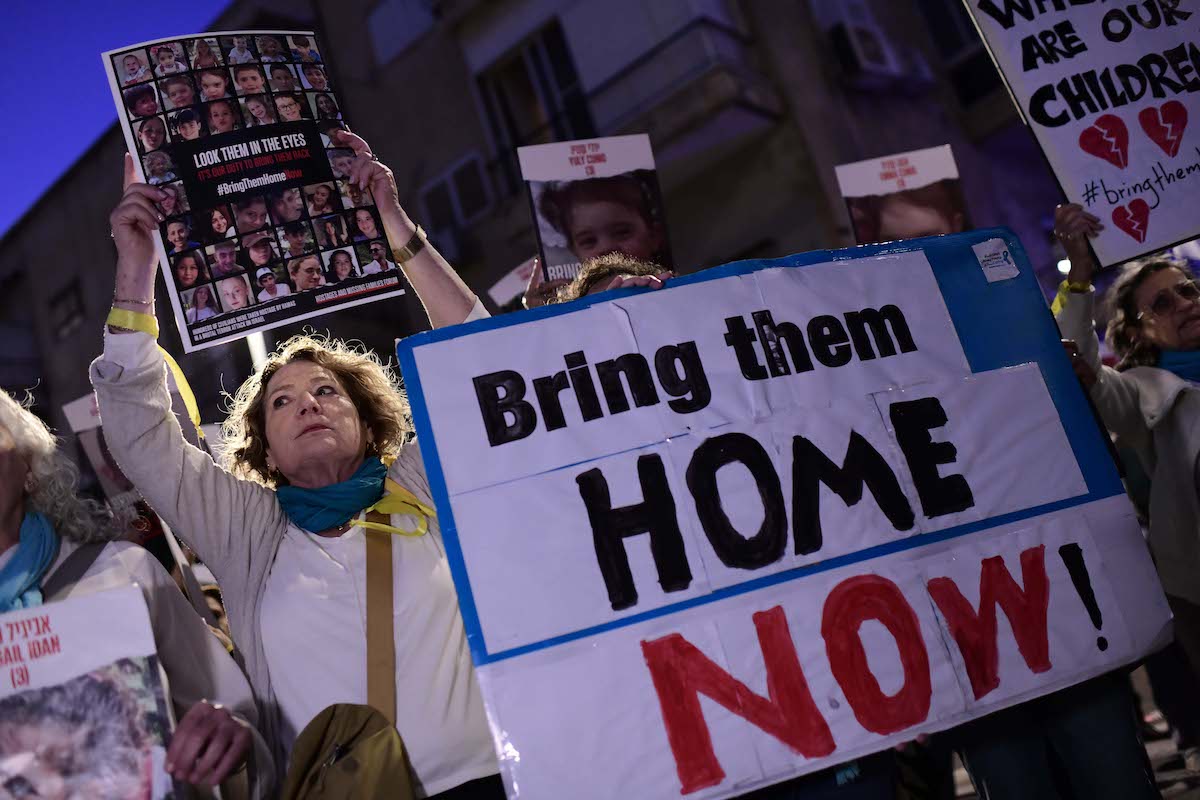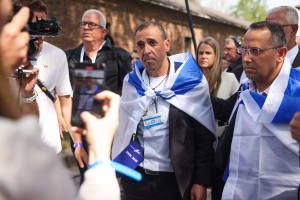Netanyahu meets with families of hostages amid reports of imminent deal
US and Hamas officials confirm negotiations are in advanced stage

Amid multiple reports of an imminent deal to release dozens of hostages, Israeli Prime Minister Benjamin Netanyahu and the war cabinet met with the hostages’ family members on Monday evening.
Representatives of the families had lobbied for days to meet with war cabinet members and hear from them in person about possible deals to exchange some of the nearly 240 captives that Hamas terrorists kidnapped into Gaza on Oct. 7.
The meeting began badly, as some family members who arrived to the meeting had to wait outside in the cold because the auditorium didn’t have enough seats.
Some also left the meeting disappointed, saying that Netanyahu didn’t clearly mark freeing the hostages as the war’s primary goal.
“What we’ve heard is that taking down Hamas and returning the hostages is … equally important,” one family member told reporters after the meeting.
Family members of the hostages were among the leaders of a protest march from Tel Aviv to Jerusalem last week, as well as a demonstration in front of the UNICEF offices in Tel Aviv on Monday, the day the United Nations marked World Children’s Day.
However, UNICEF (United Nations Children's Fund) has so far has paid very little attention, if any, to the 38 kidnapped Israeli babies, toddlers and youth under the age of 18.

Shortly after the meeting, Netanyahu stated that returning the hostages was a “sacred and supreme task.”
“I listened to the pain of the families. We spoke heart to heart, I shared with them as much as I could about the political, intelligence and operational efforts that we’re carrying out around the clock.”
“I told the dear families: Our abductees are always on my mind – from the moment I get up in the morning until I go to bed late at night – all the time,” the prime minister stressed.
Meanwhile, a deal to free hostages in return for several days of pause in fire exchanges in the Gaza Strip, under mediation by the U.S. and Qatar, seems to be moving closer to completion.
In parallel to the meeting in Israel, U.S. President Joe Biden was asked by reporters if he thought a deal was near, to which he answered: “I believe so.”
On Tuesday morning, Hamas leaders also confirmed that a deal may be close. Ismael Haniyeh, the leader of the Hamas organization based in Qatar, confirmed on his Telegram account: “We gave our answer to the Qatari mediator. We are getting closer to a ceasefire agreement.”
Another senior Hamas official, Izzat al-Rishq, told the Al Jazeera network that the announcement of the deal would be left to Qatari officials.
“We have submitted our answer. They will complete the matter in the next few hours and then announce the achievement of this agreement. I hope it will be completed,” he said.
Al-Rishq added that the deal included a fire pause but not a total ceasefire by Israel.
“During this period, aid will be introduced to all areas of the Gaza Strip in exchange for the release of Israeli abductees, women and children, at the same time as the release of a limited number of Palestinian prisoners, women and children, from prisons in Israel.”
The exact details of the deal are not yet clear and haven’t been confirmed by either side. Israeli officials have been cautious during the last few days, with one official warning that, in the end, the decision came down to “one psychopath,” meaning Hamas leader Yahya Sinwar. Nevertheless, on Tuesday Israel’s Channel 12 news cited a senior Israeli official as saying “We are very close.”
The deal is expected to include the release of between 50 and 70 hostages, mainly mothers and their children. Because Hamas has claimed not to have the exact locations of all the hostages, the agreement will probably include an initial release of hostages, with Hamas agreeing to locate more hostages during the fire pause.
In exchange, Israel will release around a 100 terrorists, focusing on women and minors, allow fuel and aid into the Gaza Strip, and to pause the fighting for several days, according to reports.
On the Israeli side, many are worried that Hamas will use the fire pause to regroup and attack IDF troops that are inside the Gaza Strip.
“A ceasefire is a dangerous thing, but we understand how to do it right,” a security source told Army Radio.
According to sources in the IDF, the Israeli troops will stay in the Gaza Strip for the duration of the fire pause. The IDF will also keep the humanitarian corridor open for passage to the southern Gaza Strip but won’t allow residents to return to the north.
The report added that the army is preparing capabilities to verify that Hamas does not violate the ceasefire, including the assurance that terrorists will not emerge from tunnel shafts to surprise attack Israeli soldiers.
“Any threat that is detected will be attacked even during the ceasefire,” the report added.

The All Israel News Staff is a team of journalists in Israel.
You might also like to read this:

















